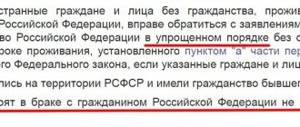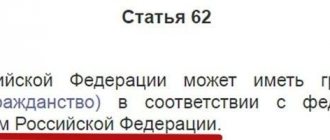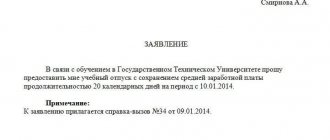All people sooner or later have to deal with not very pleasant bureaucratic procedures.
Obtaining a visa or residence permit, getting a job, first visit to the tax office. However, we get confused when we see something new for ourselves in the document we are filling out - for example, in the form we are asked to fill out the “Citizenship” column.
What is Russian citizenship, how to correctly fill out information about your affiliation with the Russian Federation in the “Citizenship” column? What is the difference between nationality? These and many other questions are answered in our article.
Basic Concepts
First of all, let's start with what citizenship is. This is described in detail by the federal law “On Citizenship of the Russian Federation”.
Citizenship is a stable legal relationship between a citizen and the state, expressed in the presence of mutual rights, duties and responsibilities.
A citizen of the Russian Federation is a person who has a legal connection with the Russian state, performs certain duties to it (paying taxes, serving in the army, etc.) and has certain rights (the right to life, voting, the right to social security).
Having two or more passports - is it necessary to indicate a second citizenship in the application form?
Let's look at which countries will allow second Russian citizenship in 2021. The Federal Law (FL) “On Citizenship of the Russian Federation” provides a definition of dual citizenship: a Russian citizen has the status of a citizen of a foreign state. A similar legal status can be obtained in states that have concluded a bilateral treaty.
Obtaining some permits a priori requires indicating the presence of a previous, second or dual citizenship. And in this case you will have to use a detailed description. Having dual citizenship is responsible for clarifying passport data and existing status.
By the way, which syllable should be stressed in the word?
? In standard forms, stress is not recorded, so this issue does not require detailed consideration. If you have recently arrived in Russia and are trying to pronounce words correctly in Russian, you need to remember that the stress in the word is placed on the second syllable.
Recommendation. Before filling out the “Citizenship” column in the application form, please clarify how to correctly write: “Russian Federation”, whether it is allowed to use an abbreviated version of the abbreviation “RF”, or whether the requirements of the regulations established the spelling as “Citizen of the Russian Federation”. Regardless of the correct version, the word is written in the nominative case.
In what cases is it necessary to fill out the “Citizenship” column?
When do you need to fill out this column? The answer is far from often, because most organizations do not need to know your citizenship - both you and they are located on Russian territory.
You will definitely see the “Citizenship” column in the following cases:
- When receiving a visa - if you fill out, for example, a Schengen visa, then the column is filled in in English
If you join government agencies (police, Federal Migration Service, FSB and many others), they need to know your citizenship, since only residents of Russia can hold positions in these organizations.
- When obtaining Russian citizenship, if you come from another country, you must indicate which citizenship you already have.
- To obtain a passport
- When receiving a visa - if you fill out, for example, a Schengen visa, then the column is filled in in English.
- In the application form for permanent residence.
- When applying for a job in any large corporations, this is usually done solely for the purpose of collecting data and at the request of the employer.
- In social surveys - if there is such a point.
How to fill out citizenship in foreign applications
A mandatory case for entering information into the “citizenship” line in foreign questionnaires. For questionnaires in English, citizenship is Citizenship. This column should be filled out according to the same principles as the Russians. That is, using an abbreviation or writing an incomplete name of the state is inappropriate. Therefore, opposite Citizenship write Russian Federation. It is important not to confuse Citizenship with Nationality. After all, the last word is translated as “nationality”. Therefore, in the line marked Nationality you must write – Russian.
Important! When filling out a foreign application or questionnaire, you have the right to request a document with a Russian translation or drawn up in English.
This is important to know: How to check the readiness of Russian citizenship in 2021
Legal registration options in the Russian Federation
What can be written in this field and what cannot:
- The Constitution states (Article 1, paragraph 2) that “the names Russian Federation and Russia are equivalent”
The correct option, which is best used everywhere, is “Russian Federation”. Write like this - and there will definitely be no complaints against you. If it’s completely official, then according to all the rules you need to write “Citizen of the Russian Federation,” but the first word is omitted even in government papers - such wording can only be found in regulations.
- In addition, it is permissible to simply write “Russia” - this will also be the correct option. Even the Constitution states (Article 1, paragraph 2) that “the names Russian Federation and Russia are equivalent” - you can use both. Even if you are applying for a job in a government agency, this form will be acceptable.
- You should not write with the abbreviation “RF”. Yes, this is also acceptable, and they will understand you, but it’s better to take 2 seconds and write the full name. But there will be no questions for you. Such filling is permissible in a social survey or when applying for a regular job - where it is not necessary and formal.
- Do not fill out this column like this: “Russian”, “Russian”, “citizen of Russia” and other similar words. No matter how logical these options seemed, it is not correct, so write differently.
- In foreign documents (the same Schengen visa), which are filled out in English, you must enter “RussianFederation” or simply “Russia”. If you don’t understand foreign languages, then this is the “Citizenship” item.
We indicate “citizenship” correctly
In all documents that require information about the citizenship of the person completing them, it is necessary to use the name of the state of which the applicant is a citizen. This is required by the rules of official business style of speech, including writing. , etc. However, only the name of the country is indicated in the documents. For example, "Russian Federation".
An important rule: when filling out any documents, the use of abbreviations is not allowed. The name of the Russian Federation is often shortened to the abbreviation “RF”. It can be heard from various sources: television, radio, newspapers, including news reports. This is unacceptable in official documents.
Of course, the above rules apply, first of all, to official papers submitted to government agencies. When filling out applications for commercial structures, for example, in connection with applying for a job, the requirements are not so stringent.
Free legal consultation
+7 800 350-51-81
Important! In some documents it is allowed to use the wording “citizen of the Russian Federation. Immediately there is a misunderstanding of how to fill out the column for female persons. But the principle is the same - we write in the same way as men, and the term “citizen” is completely unacceptable.
What the law says
The official name of the state is defined in the Constitution of the Russian Federation. Yes, Art. 1 of this law states that the names “Russian Federation” and “Russia” are equivalent. In this regard, in official documents where indication of citizenship is required, citizens of the Russian Federation can use both of these names.
The concept of citizenship of the Russian Federation is given in the Federal Law “On Citizenship of the Russian Federation”, where such wording is the only acceptable one.
Difference by nationality
Nationality indicates the country in which you live
Another pitfall that you will encounter along the way is that you risk confusing the columns “Citizenship” and “Nationality” (in English these are “Citizenship” and “Nationality”).
What is their difference?
Nationality is belonging to an ethnic group.
For example - Russian, Kalmyk, Yakut, Georgian. And citizenship indicates the country in which you live.
That is, a person’s nationality is written “Belarusian,” but at the same time he has Russian citizenship.
In addition, a person may not have a nationality, but most often has citizenship (with the exception of stateless people, stateless people).
Most likely, you will have problems distinguishing between these two columns when working with foreign documents (visas). It is complicated by the fact that in some languages (for example, French) the words “citizenship” and “nationality” are translated the same way.
There is only one piece of advice here - read the document carefully, contacting a translator if necessary.
How to distinguish citizenship from nationality
Nationals of some states may use one concept to denote their nationality and affiliation with the country. In the Russian Federation, these concepts never coincide.
The concept of citizenship is the politically significant territorial and legal affiliation of a person to the country whose passport he has. Examples include: citizenship of the Russian Federation, Germany, the Netherlands, and Great Britain. Nationality is often confused with national characteristics.
Nationality is a genetically determined membership in an ethnic group, going along the family line, inherent in close relatives. Example: German, Dutch, English, Belarusian.
In some countries, the words denoting nation and citizenship are identical. Example: Frenchman - French, Egyptian - Egyptian citizenship, Pole - Polish citizenship.
The issue of the difference between genetics and territories can be solved in a logical way. In order not to get confused in concepts, you need to test the meaning of the following sentence: I am Russian, a citizen of Russia, I can be a citizen of Germany, but I will not cease to be Russian by nationality.
List of documents
How can you confirm your citizenship, if necessary, there are quite a few such documents:
- A Russian passport is issued only to Russian citizens upon reaching 14 years of age.
A passport is your main document proving citizenship (this is one of its main functions). A Russian passport is issued only to Russian citizens upon reaching the age of 14 or after they have received citizenship after moving to the country.
- A foreign passport is the second most important document after the Russian passport. It is used mainly to confirm citizenship when traveling abroad, but in fact, a foreign passport is also valid in Russia. It can be used to buy plane and train tickets, so this document can also be used at home.
- A diplomatic passport is a type of international passport that is issued only to senior government officials (State Duma deputies, members of the Government and others). It differs from a foreign passport only in that it provides expanded opportunities for visa-free border crossing. But they have no other special differences from it.
- A service passport is another document similar in status to a foreign passport, which is issued to employees of the Presidential Administration, employees of the Central Bank and similar organizations. It is issued for a very short period (up to 5 years) and only in connection with a business trip abroad.
- Military ID - issued either to military personnel or to those declared unfit for service. It is an identification document only for those called up for service - this is a special case, since a military ID temporarily replaces a passport for them and becomes the main document confirming citizenship.
- Birth certificate - up to 14 years of age, when a citizen has not yet received a passport, it is the certificate that is the main (and at this time the only) document confirming identity. After 14, when the child is required to obtain a passport, it loses its validity and cannot be used to obtain a visa, tickets, etc.
Rules for filling out the column in the form
Let’s formulate a list of rules - how to fill out the “Citizenship” column in documents:
- It is better to refrain from abbreviations, as well as from options like “rossiyskoe” or “russian”
Write the full answer in the field: “Russian Federation.” It is better to refrain from abbreviations, as well as from options like “Russian” or “Russian”.
- If you have another passport besides the Russian one (another citizenship), then you need to write about this in free form under the primary citizenship field, indicate the reason (change of place of residence, ownership of real estate, relatives) and add the details of the second passport.
- Please fill out everything in neat, legible handwriting. If you write unclearly, use block letters.
- If you decide to write “Citizen of the Russian Federation” in the citizenship field , then remember - always write in the masculine gender, regardless of your gender. You cannot fill in the field with the words: “Citizen of the Russian Federation”! Citizen is not a position like teacher/teacher or secretary/secretary. This is your status, and it has only one correct spelling.
Subtleties of dual citizenship
French or American citizenship does not have any effect on your legal status
According to the laws of the Russian Federation, in order for a person to have, for example, dual citizenship of France and Russia, they must have a special agreement.
Our country had only 2 such agreements - with Turkmenistan (expired in 2015) and Tajikistan, which is still in force.
In addition, we have a similar Treaty of Friendship with Abkhazia, but this is a special case.
So, you are considered as a person with dual citizenship only if you have passports of the Russian Federation and Tajikistan.
In other cases (if you have passports from other countries), for the law of Russia you are, first of all, a Russian and a citizen of Russia.
French or American citizenship does not have any effect on your legal status. But at the same time, you must notify the FMS in a special statement about the existence of a passport from another country - otherwise you will face a large fine of 200,000 rubles or more.
In the “Citizenship” column, if you have a second passport, below, after indicating your primary Russian citizenship, indicate in free form in which country you are still a citizen and for what reasons (permanently live, have real estate, relatives).
For example: “I, Denisov Denis, received in 1999, in addition to Russian citizenship, also US citizenship due to receiving an inheritance in this country.” After this, write down the details of your second passport - usually this is enough.
Difference between citizenship and nationality
A lot of confusion arises from a lack of understanding of the difference between the terms “citizenship” and “nationality”. What is it?
Citizenship is a stable legal relationship between a citizen and the state, which consists of their joint responsibilities towards each other and mutual rights.
Nationality is the ethnicity of a person to a particular nation.
Nationality can be very different - Russian, Tatar, Chuvash, Ukrainian, Pole . This fact cannot in any way determine a person's citizenship. For example, representatives of hundreds of nationalities live in Russia. However, the law determines that nationality cannot influence the status of a citizen of the Russian Federation, in other words, all citizens in the country are equal, regardless of ethnicity.
That is why the wording “Russian” in the “citizenship” column is completely unacceptable, since it only implies ethnicity. In addition, it is known that millions of people who are Russian by nationality are citizens of other countries and do not have citizenship in Russia.
What should those born in the USSR do?
The only time you may be required to mention your previous passport is when applying for a visa
Some may have a question: what should I do if I am a former citizen of the USSR? What should I write in my documents?
Don’t worry, you are one of the exceptions, and by law you only indicate your current citizenship.
The only case when you may be required to mention your previous passport is when applying for the same ubiquitous visa.
There you need to indicate your country of birth - fill in the field with the word “USSR”. There is no need to write anything more about this.
What to write when changing citizenship?
If you changed your citizenship from foreign to Russian, and now you need to fill out the corresponding column, then, as if you have a foreign passport, indicate the reason why you changed citizenship.
For example: “I, Ivan Ivanov, in 2005 changed my Belarusian citizenship to Russian citizenship due to a change of residence.” For former residents of Ukraine, the reason may also be a military conflict - however, here we are more likely talking about political asylum.
Now you can always figure out what and under what circumstances you need to write in the citizenship column, why this is required and how to correctly fill out documents with this field.
What to write if you have dual citizenship
The law allows that a citizen of the Russian Federation can have dual citizenship. This is possible only if there are interstate agreements that are concluded between Russia and some other countries. Although the last requirement is not always met in practice.
Attention! The presence of dual citizenship does not at all detract from the degree of rights and freedoms that citizens of the Russian Federation can enjoy.
In the column under consideration, bipatrids (this is what people who have dual citizenship are called) must, first of all, indicate their affiliation with the Russian Federation according to the rules mentioned above. And only then do they provide information about belonging to another state. They are indicated in free form.
If the applicant changed citizenship, that is, for some period he was a citizen of another state, then this fact should also be reflected when filling out some documents . In this case, the reason for its change is also indicated in detail.










